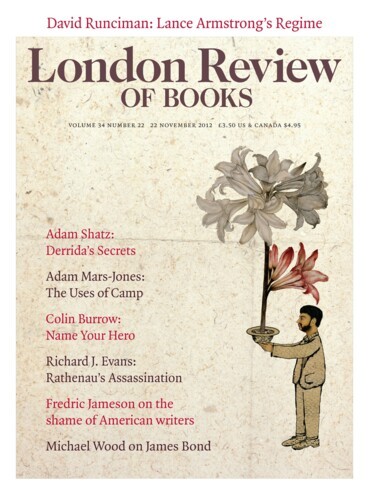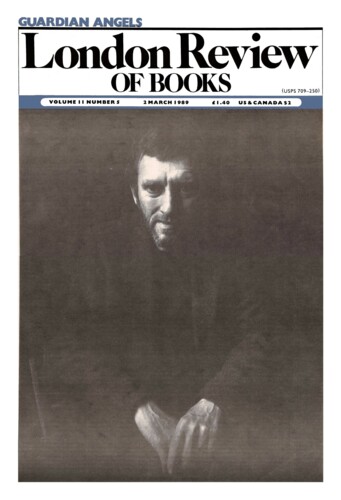Alastair Fowler
Alastair Fowler is Regius Professor Emeritus of Rhetoric and English Literature at the University of Edinburgh and Visiting Professor at the University of Virginia. His most recent book is A Short History of English Literature and he is working on the New Oxford Book of l7th-Century Verse.
Slants
Alastair Fowler, 9 November 1989
Eliot may not have been wrong in valuing ‘workshop criticism’, or criticism by poets. True, criticism as we know it consists largely of interpretation and evaluation, activities in which writer-critics have no special advantage over critics pure and simple (if the latter description will quite do for Post-Structuralists). But writers have a manifest advantage in criticism that addresses the craft of literature. And this, it seems to me, is a genre of criticism we need much more of, if the art is to thrive. For we now have so many interpretations, and schools of interpretation, and interpretations of schools of interpretation, that many have become unsure what a good poem is – or whether it may not really be bad, or even bourgeois. But how is our need to be supplied? For to write adequately on literary craft calls for more than just any old critic. Only a generalist can hope to put it all together and restore a sense of what poems are really up to, as distinct from what critics have tried to make them.’
A New Theory of Communication
Alastair Fowler, 30 March 1989
Collaborative writing is necessarily less common in the humanities than in science and medicine. And it seems rather less common now than in the Forties, when I was making a false start in medicine (the decade when Wimsatt and Beardsley collaborated on The Verbal Icon). Is it that we have become more competitive, more serious? ‘Not on your life, boy,’ my colleague John Hay in the anatomy lab used to say, but he would be helpfully turning a cadaver’s hand in response to my ‘Give me some palm, Olive’ and didn’t have to say he meant quite the opposite. Is it mutual supportiveness that makes collaborative writing work? Or the added range, the drawing on more and wider associations? In the case of Dan Sperber and Deirdre Wilson’s Relevance, collaboration has been able to draw on feminine and masculine resources – although I am far too afraid of my feminist colleagues to say which resources are which. Anyway, like Gilbert and Sullivan, or Somerville and Ross, Sperber and Wilson make a great team. Sperber’s On Anthropological Knowledge and Rethinking Symbolism, written solus, were brilliant essays: but Relevance is more systematic and technical, and Wilson may be guessed to sing its cantus firmus. The result is a decisive contribution to our thinking about language.’
Undecidability
Alastair Fowler, 2 March 1989
We cannot let Shakespeare alone. He saw so deeply into life, and wrote so well, that we cannot bring ourselves to relegate him to his Elizabethan world, as we do, or used to do, with Jonson. Yet when Shakespeare is taken out of period, his works become problematic, since they are not referred to appropriate contexts, to the domains of assumption they address. So Shakespearean hermeneuts go round and round in wandering mazes lost. And now a new difficulty besets them, making it harder still to achieve perspective: the additional burden of ‘method’, of having to adopt a distinctive (and necessarily irrelevant) theoretic approach. Fortunately Graham Bradshaw, a lover of literature rather than criticism, is a robust simplifying writer in the Empsonian tradition, who knows that abstract theoretic discourse has had its day. He has the boldness, moreover, to cut hermeneutic knots by ignoring much recent work – including, unfortunately, some of the best American criticism and scholarship. On the whole, he confines the monster Monistic Theory to its cave: although the gapped hoof of deconstruction occasionally sticks indiscreetly out, and Nietzsche is invoked much oftener than Bradley.’
Pieces about Alastair Fowler in the LRB
I, Lowborn Cur: Literary Names
Colin Burrow, 22 November 2012
When the keen birdwatcher Ian Fleming needed a name that sounded as ordinary as possible, he had to look no further than the title page of James Bond’s great work, Birds of the West Indies.
Gesture as Language
David Trotter, 30 January 1992
According to Boswell, Johnson was so hostile to gesticulation that ‘when another gentleman thought he was giving additional force to what he uttered, by expressive movements of his hands,...
Return to the Totem
Frank Kermode, 21 April 1988
This Textual Companion is described by the publisher as ‘an indispensable companion to The Complete Oxford Shakespeare’, which indeed it is, and it was reasonable to complain, when
A la mode
Graham Hough, 18 October 1984
New works of literary theory, abundant in France and America, are not very frequent in England. When one does appear, it is customary first to deplore its defiance of nature and reason, and...
Read anywhere with the London Review of Books app, available now from the App Store for Apple devices, Google Play for Android devices and Amazon for your Kindle Fire.
Sign up to our newsletter
For highlights from the latest issue, our archive and the blog, as well as news, events and exclusive promotions.




